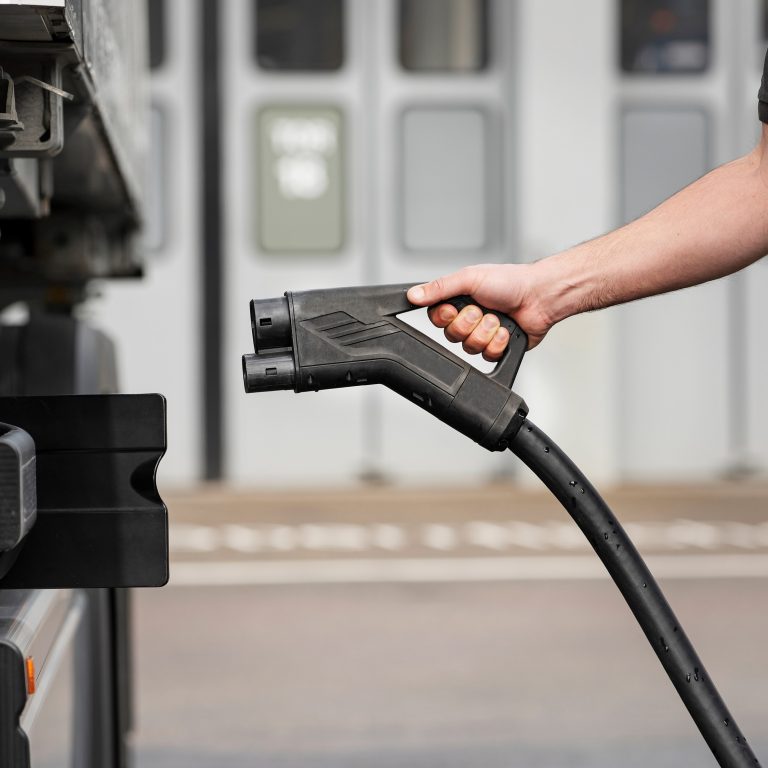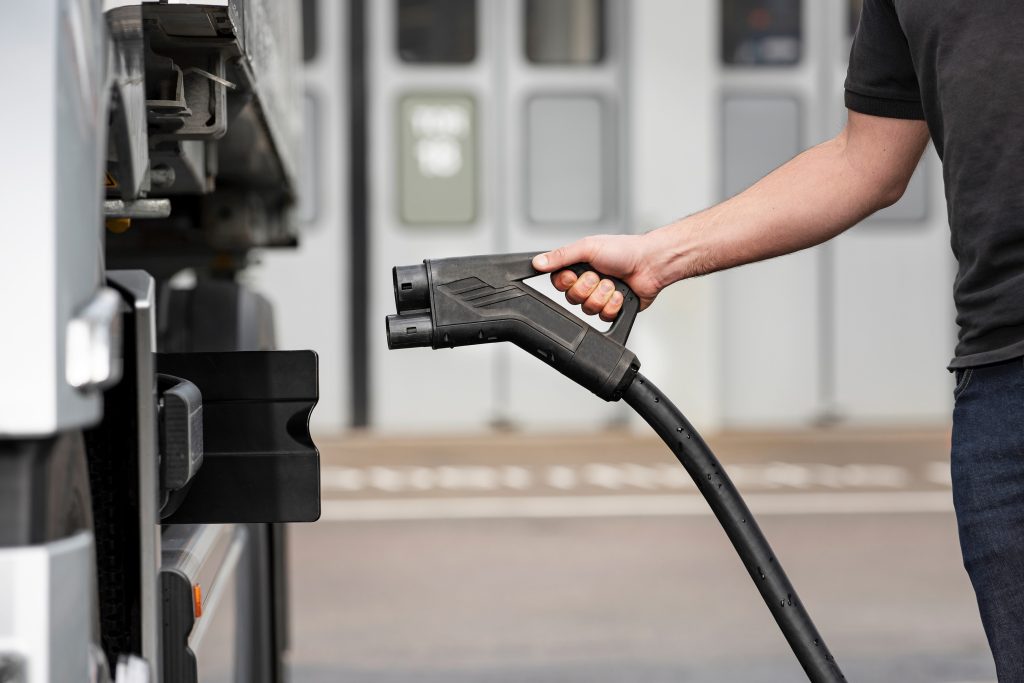As the transport industry goes electric, there are new concepts and terms that drivers and transport companies will need to know. Familiar phrases like litres/100km will be replaced by kilowatt-hours/km, or kWh/km. The price per litre of diesel will eventually no longer matter; you’ll start looking at the price for a kWh of electricity. Concepts like fuel efficiency will be left in the past as energy efficiency becomes king.
Terms like kilowatts, kilowatt-hours, and megawatts might sound foreign at first, but once you understand them, they will be as familiar as your favourite truck stop or radio station.
To start, there are a few main terms that are useful to know:
Kilowatt (kW) – A unit of power similar to horsepower (in fact, 1 kW equals 1.341 hp). A watt is calculated by multiplying amps times volts, and a kW equals 1000 watts. For electric vehicles, kW can refer to the charging power, which determines how quickly a vehicle is charged, or to the vehicle’s own power output while driving. Today’s electric trucks normally have maximum power outputs of between 300 and 500 kW, equal to approximately 400 to 675 hp.
Megawatt (MW) – Equals 1000 kW and is normally discussed in the context of the Megawatt Charging System, explained below.
Kilowatt-hour (kWh) – Refers to an amount of energy used or stored. Is it equal to one kW of power output for one hour. Most passenger cars have 50 to 100 kWh batteries. Today’s heavy-duty electric trucks have between 250 and 600 kWh of battery capacity.
Combined Charging System (CCS) – The most common charging standard for electric vehicles, including passenger cars and trucks in Europe. Most CCS chargers have a maximum power output of between 50 and 400 kW.
Megawatt Charging System (MCS) – A new charging standard for heavy-duty electric applications, such as heavy trucks, boats, and industrial applications. The MCS standard will have a maximum power output of up to 3.75 MW, equal to 3750 kW, and will be commercially available by 2024.
Joost’s electric truck journey in 2024
To easily understand how truck charging works in practice, let’s meet a Dutch truck driver named Joost. Joost’s electric truck normally drives with a Gross Train Weight of 40 tonnes, carrying cargo from the Port of Rotterdam in the Netherlands to a warehouse outside Cologne, Germany – a round trip of around 500 kilometres.
Joost’s truck has a usable battery capacity of 400 kWh and is equipped for CCS charging of up to 375 kW.
He starts his day in Rotterdam with a full battery after charging his truck overnight. Overnight charging is easy, as 400 kWh can be charged in 8 hours even with a relatively low-power, 50 kW charger. (If we do the math, 50 kW x 8 hours = 400 kWh).
After picking up his cargo, Joost begins the 250 km journey to Cologne at 7:00. Mostly driving 80 km/h but with some traffic on the way, Joost arrives in Cologne at 10:30 with 25% battery capacity remaining. He drove 250km with 1.2kWh/km efficiency, meaning the truck consumed 300 kWh of energy and he has 100 kWh remaining (250 km x 1.2 kWh/km = 300 kWh).
After unloading his cargo in Cologne and taking a new load for the trip back to Rotterdam, Joost is ready to go at 12:00.
Since it’s now lunch time and Joost’s truck needs recharging for the trip home, he stops for a 45-minute rest-and-recharge break at a nearby Milence charging location. With his truck plugged into a 350 kW CCS charger, Joost takes a quiet lunch break before unplugging and setting off. In 45 minutes, his truck has charged a bit more than 250 kWh (350 kW x 0.75 hours = 262 kWh), meaning his truck now has more than enough energy to return to Rotterdam.
Arriving in Rotterdam at 16:00 and beating the worst of the rush hour traffic, Joost unloads before leaving his truck at the depot for overnight charging.
Good to know: When using a high-power charger, the charging speed is most often determined by the vehicle, not by the charge point. If a truck can handle a maximum charging power of 250 kW, it will only charge at up to 250 kW, even if plugged into a 300 or 350 kW charge point. Conversely, if a vehicle can charge at 250 kW but is attached to a 150 kW charger, it will only charge at 150 kW.
Susanna’s electric truck journey in 2027
While there are many transport applications that are ready to be electrified today, longer-distance electric truck journeys will be made easier with the introduction of the Megawatt Charging System (MCS). By 2024, there will already be trucks equipped for megawatt charging, and we will be deploying MCS chargers around Europe. To see what this longer-distance electric trucking might be like, let’s imagine a Swedish truck driver named Susanna.
Susanna works for a logistics company based in Stockholm, and twice a week she drives to Malmö, a round-trip journey of over 1200 km. Her 40-tonne truck has 600 kWh of usable battery capacity and can charge at an average of 800 kW using MCS.
Susanna starts her day by setting off from a warehouse in Stockholm at 8:00. Just like Joost, her truck was fully charged overnight.
Susanna’s first stop is in Jönköping, about 320 km south of Stockholm. Her fleet manager has already booked a charging slot for her at the Milence charging location there, so she knows there will be a charger available when she gets there.
Covering the distance in four hours with 1.3 kWh/km efficiency due to colder temperatures, Susanna’s truck uses 420 kWh of energy. This means her truck has 30% of battery capacity remaining when she arrives at 12:00, just in time for her statutory 45-minute break. When she arrives, she plugs into a megawatt charger and her truck starts charging automatically.
In addition to this being a good time to charge her truck, she can also go to the restroom, stretch her legs, and have lunch. Because Susanna’s truck is equipped for MCS charging, she can recharge the 420 kWh during her break. With an average charging power of 800 kW, it’s completely recharged in a little over half an hour (800 kW x 0.525 hours = 420 kWh).
Setting off for Malmö at 12:45, Susanna covers the remaining 300 km in about four hours. She loses a little bit of time due to traffic jams and construction, but makes it to her destination before 17:00.
Before preparing for a night in the truck, Susanna drops off her trailer at the warehouse and then drives a short distance to a nearby Milence charge point, located inside a Safe and Secure Truck Parking Area. Plugging her truck into a low-power overnight charger, Susanna reheats a home-cooked meal in her truck’s microwave before giving her family in Stockholm a call and going to bed.
The next day, she again starts with a full battery before picking up another trailer and heading back to Stockholm, again with a stop to charge in Jönköping on the way.
Good to know: While MCS will be capable of power outputs of up to 3.75 MW, it is unlikely that such a high power level will be necessary for trucks and coaches. Power levels of 800 kW to 1.5 MW will be sufficient for most, if not all, trucking applications.



